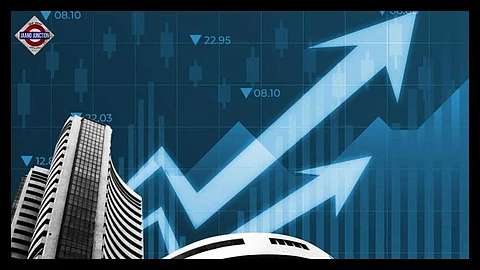

Stock markets kicked off Monday's trading session with a spectacular rally as a ceasefire agreement between India and Pakistan brought relief to jittery investors. The easing of geopolitical tensions, combined with positive global cues and a sovereign credit upgrade, sent benchmarks soaring.
The BSE Sensex was up 1898.83 points to 81,353.30 at around 9:31 am, while the NSE Nifty50 climbed 598.60 points to trade at 24,601.05. All the other broader market indices also jumped sharply in early trade. Heavyweight stocks such as Axis Bank, Bajaj Finserv, Bajaj Finance, Adani Ports and Reliance also rose as much as 4%
Market sentiment received a strong boost from signs of de-escalation between India and Pakistan, following days of missile and drone strikes across the border. According to Prashanth Tapse, Senior VP (Research) at Mehta Equities Ltd., investors welcomed the temporary calm but remain cautious.
“A thawing of the relationship between India and Pakistan is likely to trigger a massive rebound for benchmark Nifty early Monday trades,” he said, but warned that “any fresh violations of the ceasefire deal from Pakistan could keep bullish sentiments fragile.”
Tapse also noted that improving US-China trade relations were helping global sentiment. He sees Nifty headed towards 24,237–24,447 in the short term, with aggressive upside targets around 24,750–24,860, assuming momentum holds.
Aditya Gaggar, Director at Progressive Shares, highlighted technical cues pointing to a strong open. GIFT Nifty, he noted, indicated a potential 500-point surge, with 24,000 now acting as a firm psychological support.
“24,250 offers immediate support, while 24,500 is a key resistance level,” he said. On the Bank Nifty, he added that 54,260–54,600 remains a resistance zone, while the downside appears cushioned at 53,950.
Gaggar sees promise in the auto sector, which he says is “a buy on dips” after breaking out of a Falling Wedge pattern. He also flagged Nazara Technologies as a breakout play in the digital entertainment space, backed by technical indicators like RSI and MACD.
The pharma sector, he believes, is emerging from its corrective phase, but pricing concerns linger.
“The right shoulder of an Inverted Head and Shoulder pattern is forming, but we'll take a more informed view once the impact of drug price controls becomes clearer,” he added.
Meanwhile, Devarsh Vakil, Head of Prime Research at HDFC Securities, focused on India's macro resilience. He credited the country’s largely domestic-driven economy and stable policy environment for weathering global shocks effectively.
“India's markets and economy have demonstrated remarkable resilience, consistently transcending external perturbations,” he said. “This strength comes from a steady, domestically oriented economy showing that every crisis eventually ends.”
Vakil pointed out that India's push for new trade deals and stronger global partnerships enhances its competitiveness and creates a more attractive investment climate.
“Balanced global relationships, steady foreign inflows, and strong business prospects make India a relatively stable investment place,” he noted.
Adding to the positive sentiment was the sovereign credit rating upgrade by Morningstar DBRS, which raised India’s rating to BBB (Stable) from BBB (Low) — a move investors welcomed as validation of India’s macro stability.
“Markets are poised for a sharp rebound today the rating upgrade will also buoy bulls,” Vakil added.
Source: India Today
